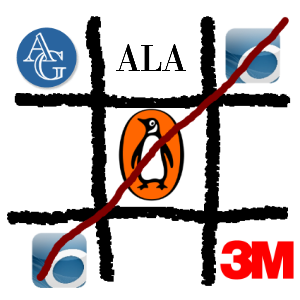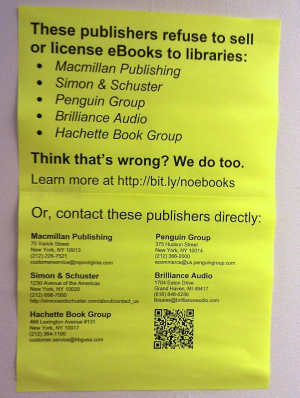Re-posting this article. Good information to know.
 Penguin’s decision to terminate its contract with OverDrive has further fractured the library ebook lending market, disturbed the American Library Association, and highlighted the difficulty in finding a single business model that all parties can be comfortable with.
Penguin’s decision to terminate its contract with OverDrive has further fractured the library ebook lending market, disturbed the American Library Association, and highlighted the difficulty in finding a single business model that all parties can be comfortable with.
And the executive director of The Authors Guild says that it is “awful” that public libraries are being put in the middle of a conflict that has embroiled the large commercial entities of Penguin, Amazon, and OverDrive.
“Despite this discouraging development, we are hopeful Penguin will continue to seek a solution to make its titles available to libraries,” said Molly Raphael, ALA’s president. “As Penguin stated, ‘…it is vital that we forge relationships with libraries and build a future together.’ We are committed to helping build this future,” Raphael said.
Raphael said ALA wants to help craft “stable and sustainable business models to connect readers and authors,” but this will be a complex challenge as different publishers have different comfort levels.
Matt Tempelis, the business manger for library systems at 3M, has had extensive conversations with all of the Big Six publishers, and he said it was clear that there is not a one-size fits all solution.
The easiest thing for us would be to have one model to deliver to the community, because every new model adds complexities to our systems,” Tempelis said. “But the reality is, when you are dealing with a variety of different companies, everyone has a different idea of how to do it.”“So far there is no resounding agreement about the perfect way,” Tempelis said. “Every publisher appears to have different hot buttons,” he said, adding that no company wanted to be a pioneer in this space. 3M’s cloud library system is a competing service to OverDrive.
Penguin’s termination of its contract with OverDrive could present an opportunity for 3M, in a broad sense.
“Obviously, we’re committed to getting every publisher engaged in libraries, so anyone involved in the market is an opportunity,” Tempelis said. OverDrive did not respond to a request for comment.
For some publishers the hot button is pricing (Random House is raising its price to wholesalers starting March 1), for others it’s a question of delayed release of titles, and for others, like Penguin, it is, as LJand others have reported, a concern about OverDrive’s third-party, commercial relationships, namely with Amazon.
Penguin and other publishers are uncomfortable with OverDrive allowing Amazon to handle Kindle checkouts via Amazon’s servers.
When Penguin first began limiting library lending in November, it said it had “informed suppliers to libraries that it expected them to abide by existing agreements to offer older digital titles to libraries only if those files were held behind the firewalls of the suppliers.” In other words, Penguin was comfortable with OverDrive, with whom it had contracted, executing the checkout, but not Amazon, with whom Penguin had not.
Publishers are not happy about not having a say in how this supply chain is put together.
“It’s really hard to overstate the impact of Amazon’s particular deal with OverDrive and the shock wave that sent through the industry,” said Paul Aiken, the executive director of The Authors Guild. “The notion that public libraries, for the first time, would be sending their patrons to a commercial website for borrowing books — and not just any commercial website but the website of the entity that has a tight grip on the online marketplace for books — was bound to get a negative reaction,” he said.
Aiken said OverDrive’s deal with Amazon gives the latter an unfair competitive advantage that bypasses other ebook vendors and bookstores, and it gives Amazon monetization opportunities that others are denied. But he said libraries were innocent bystanders.
“It’s awful that libraries are being put in this position,” Aiken said. “Accessibility is mightily important to authors. They want readers. But it’s a complex situation and everyone’s trying to figure out their place in this,” he said.
Even though from a business perspective a distributor like 3M wants to minimize complexities, the publishers are not necessarily so interested in simplicity, since they view “friction” in the library transaction as an important safeguard to their sales.
“We want to insure that customers who have typically been book buyers do not migrate their purchasing into borrowing as accessibility to our books becomes frictionless,” as Alison Lazarus, the president of sales for Macmillan, previously told LJ. “This would imperil our retailers, wholesalers, authors and ourselves and would ultimately be detrimental to libraries,” she said.
Some publishers like the idea of in-library lending of ebooks as a way to recreate the “friction” of a print transaction: The patron has to physically go to the library.
The 3M model offers such an option, through its library kiosks, but while it may make some librarians happy, because it brings people back into the library, it is not going to be a selling point for every publisher, according to Tempelis.
“You’ll have three that hate it and one that will kind of like it,” Tempelis said.
Meanwhile, even though Penguin has said it remains committed to finding a library model, its decision effectively prevents libraries from acquiring any additional Penguin titles for now (titles already in the catalog should continue to be available).
The latest development has prompted Sarah Houghton, the acting director for the San Rafael Public Library who blogs as the Librarian in Black, to post signs in the library protesting the unwillingness of some publishers to license ebooks to libraries.
“As a librarian and as a reader, I am tired of publishers walking away from the library table,” Houghton wrote. “I have no problem with them walking away from a particular third party vendor, but only if they have a plan in place to offer up their own platform or be signed with an alternate vendor already.”
She said that gaps in availability of titles “equals stupidity in my opinion.”
Raphael said the goal should be full access.
“We all need to work together—and quickly—to bring about full access to ebooks in libraries for everyone, and especially for those readers who depend on libraries as their only source of reading material,” she said.

No comments:
Post a Comment